Key takeaways:
- Bias can obscure our judgment, urging us to confront our beliefs and seek diverse perspectives to make informed choices.
- Pro-life advocacy emphasizes compassion for both unborn children and women, highlighting the need for support systems during unexpected pregnancies.
- Common misconceptions about pro-life advocates include a lack of empathy and a narrow focus on abortion; many advocate for comprehensive care beyond just prevention.
- Engaging in constructive, empathetic conversations, sharing personal stories, and seeking diverse viewpoints can bridge gaps in understanding regarding pro-life issues.
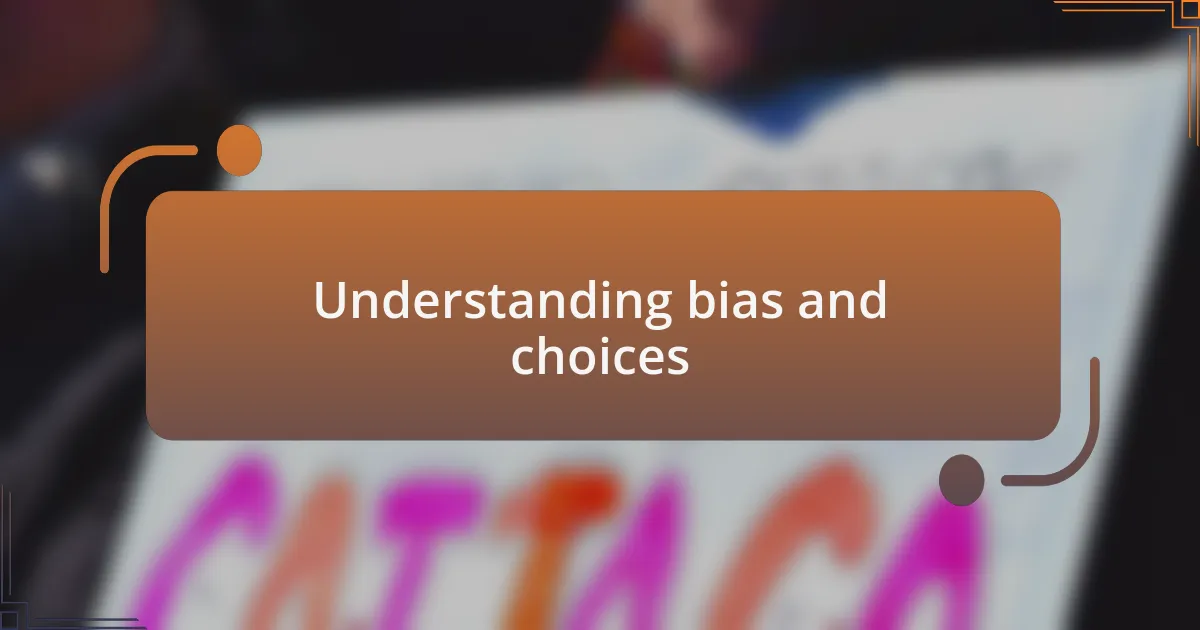
Understanding bias and choices
Bias influences our choices in subtle yet profound ways. I remember a time when I was faced with a critical decision regarding my stance on a social issue. I found myself gravitating towards opinions that echoed my existing beliefs, which made me reflect: am I truly open to considering all perspectives, or am I just reinforcing my biases?
Understanding the roots of our biases can illuminate the choices we make. I once participated in a discussion group where we examined our values. It was eye-opening to realize how my experiences shaped my beliefs, often without my conscious awareness. How often do we let our past dictate our present decisions, instead of approaching each choice with a fresh perspective?
Choices often feel straightforward, yet biases can cloud our judgment. I’ve caught myself in moments of hesitation, wondering if I was making a fair decision or just defaulting to what felt comfortable. This realization prompted me to actively seek out information that challenged my views, proving that confronting bias can be a transformative journey—one that enriches both my understanding and the choices I make.
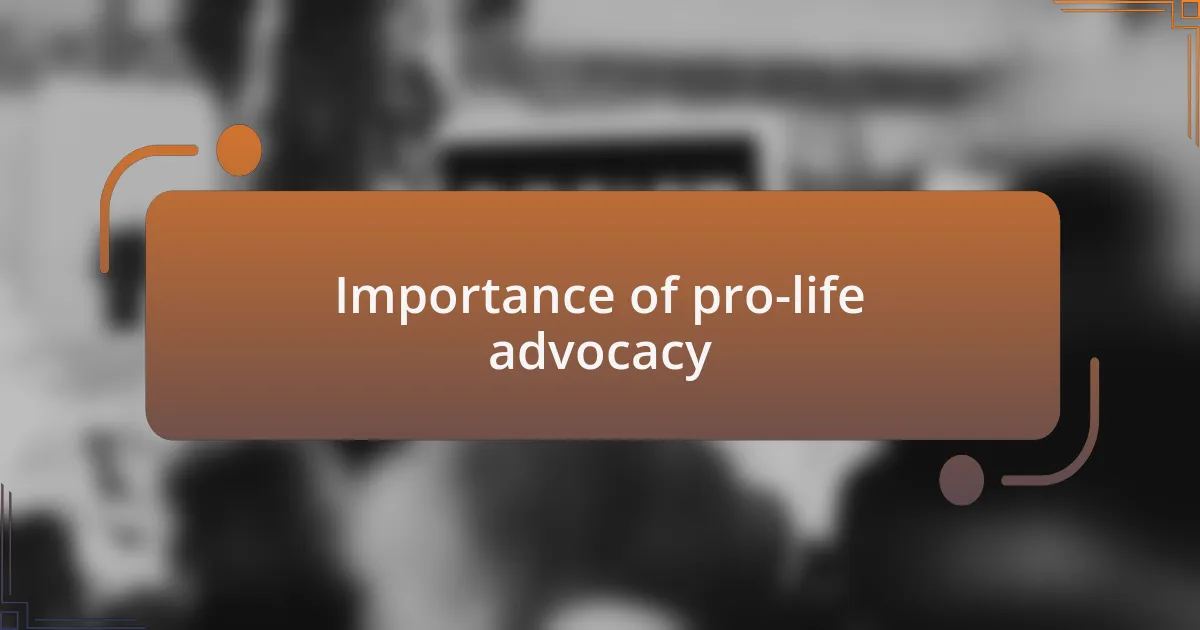
Importance of pro-life advocacy
Pro-life advocacy is crucial as it stands up for the rights of the most vulnerable—unborn children. I vividly recall attending a pro-life rally, surrounded by passionate voices united in a common cause. That day, I felt a profound sense of responsibility; we were collectively amplifying the voices that often go unheard. It made me question how many opportunities we miss to protect innocent lives when biases overshadow our decisions.
This advocacy also brings to light the importance of providing support to women facing unexpected pregnancies. I have heard numerous stories of women who, rather than feeling empowered, felt pressured to choose abortion due to lack of options or support. By championing pro-life values, we can foster a culture that prioritizes compassion, understanding, and practical help, ensuring women feel loved and supported in their choices.
Moreover, pro-life advocacy challenges society to reconsider its values. When I reflect on the conversations I’ve had with friends, it strikes me how often we shy away from discussing these issues. Yet, engaging openly about the sanctity of life can prompt deeper understanding and empathy. Isn’t it essential for us to consider how every life has potential, and how our actions today can pave the way for a compassionate future?
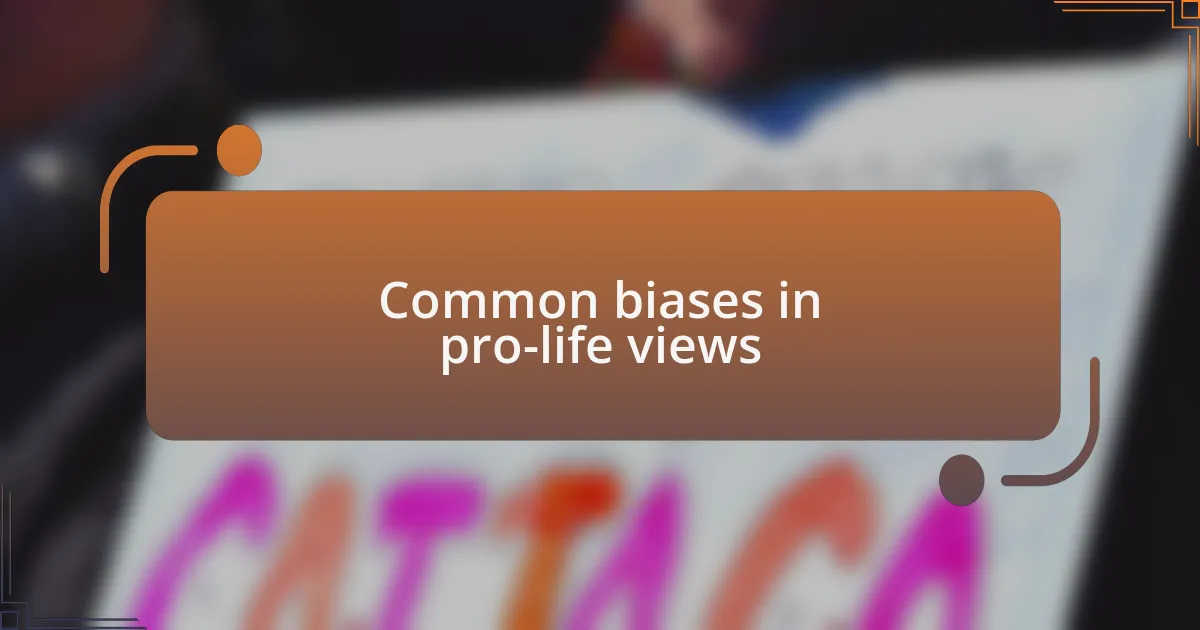
Common biases in pro-life views
When exploring common biases in pro-life views, one major misconception surfaces often: the belief that pro-life advocates lack empathy for women’s circumstances. I remember a heated discussion with a friend who assumed that my pro-life stance meant I disregarded the complex emotions women experience during pregnancy. However, I see it differently; my advocacy is rooted in deep compassion for both the unborn child and the mother. Challenging this bias often leads to enlightening conversations about the support systems we can build for women facing difficult choices.
Another bias I frequently encounter is the notion that pro-life advocates are solely focused on preventing abortions. In reality, I strive to articulate a broader vision that includes advocating for comprehensive care options, emotional support, and resources for those facing unplanned pregnancies. At one point, I volunteered at a pregnancy resource center and saw firsthand how miscommunication about pro-life values can steer people away from understanding the hope and assistance we can offer. Isn’t it interesting how a shift in perspective can illuminate a more holistic approach to the issue?
Lastly, there’s the bias that equates religious beliefs solely with pro-life values. While many pro-life advocates may be driven by their faith, my journey has shown me that this cause transcends religious boundaries. I’ve met countless individuals from diverse backgrounds who passionately advocate for the rights of the unborn without any religious affiliation. Reflecting on these conversations reminds me that the commitment to life embraces a multitude of perspectives—each one adding to the rich tapestry of our shared humanity. How can we engage more people in this essential dialogue?
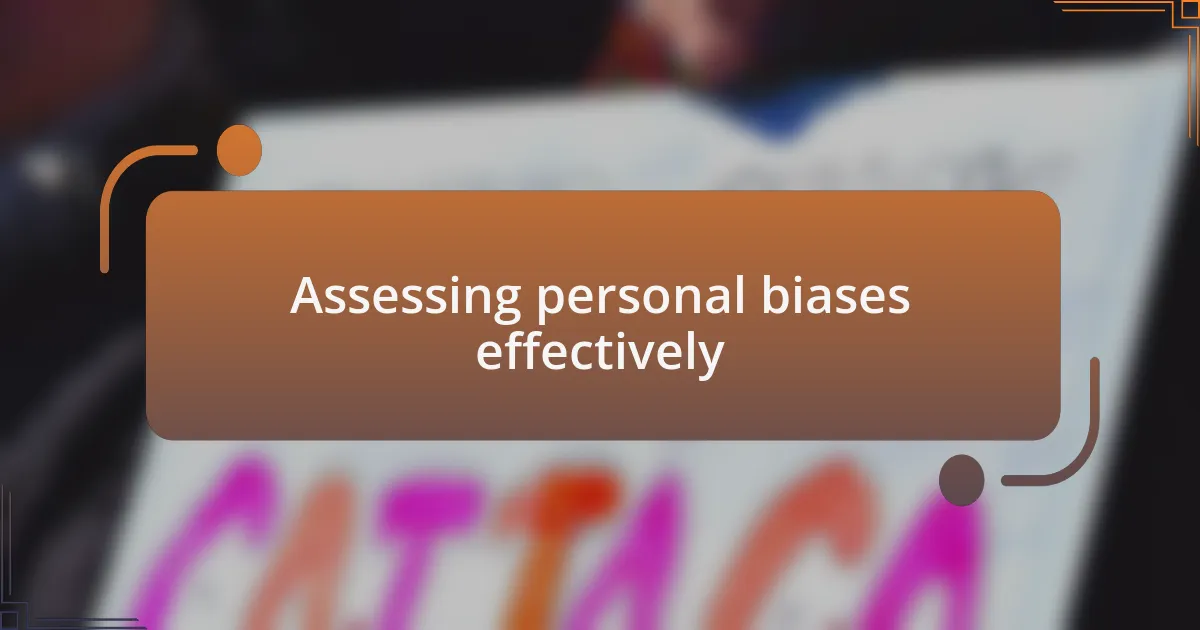
Assessing personal biases effectively
When I reflect on my own biases, I find it crucial to actively question my perspectives. For instance, after attending a workshop on empathy in advocacy, I realized that I had unconsciously dismissed viewpoints different from my own. This kind of self-assessment not only broadens my understanding but also deepens my compassion, fueling more meaningful dialogues.
One practical way I’ve learned to assess my biases is by seeking feedback from diverse voices. Sometimes, I’ll engage in discussions with peers who challenge my views. I remember a conversation with a colleague who held a starkly different opinion on reproductive issues. Their insights compelled me to reconsider my assumptions and opened my mind to the complexities of the pro-life movement, reminding me that biases can distort our understanding of shared goals.
I often engage in self-reflection after difficult conversations where my biases might surface. Asking myself tough questions, such as “How might my background influence my stance?” has been a valuable tool. This process not only makes me aware of my biases but also encourages a continuous journey of learning and growing in my advocacy, ultimately fostering deeper connections with those I hope to engage.
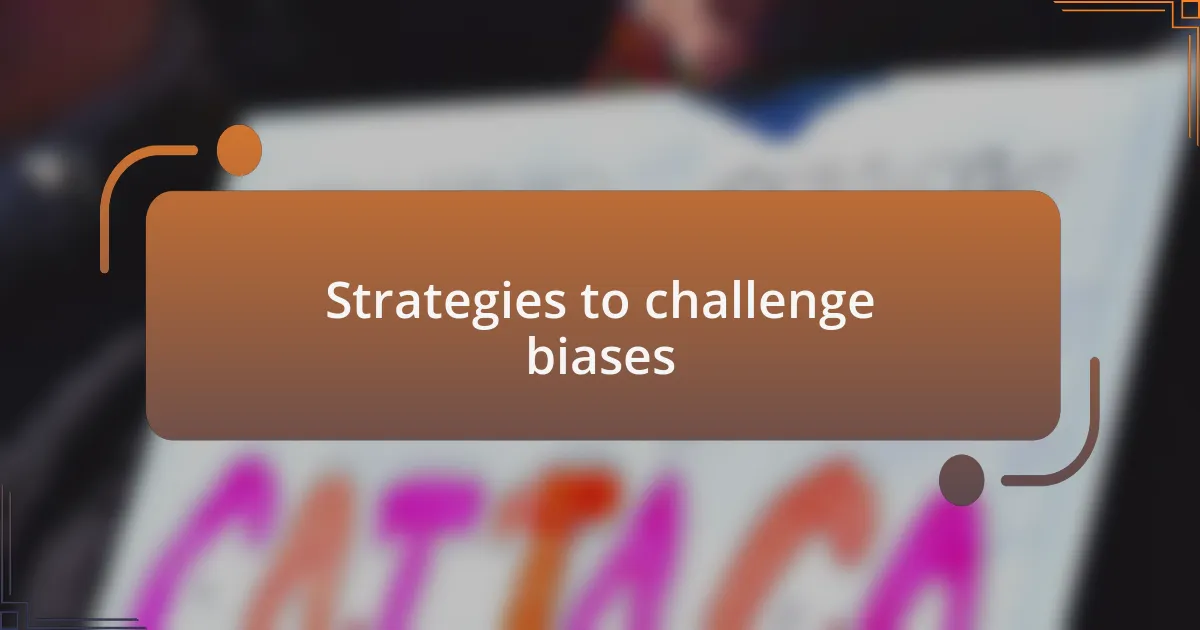
Strategies to challenge biases
One effective strategy I’ve found to challenge biases is to immerse myself in literature and media that present alternative perspectives. Recently, I delved into a book that framed abortion not just through a moral lens but also explored the socioeconomic factors surrounding it. That experience opened my eyes to the multifaceted nature of this issue and made me reflect: how often do I seek out sources that provoke discomfort or disagreement? It’s enlightening to confront these narratives directly.
Another approach is embracing difficult conversations as opportunities for growth. I recall a heated discussion at a local community meeting where emotions ran high. While I initially felt defensive, I soon realized that listening to opposing views allowed me to better articulate my stance and, in turn, understand the fears and motivations behind others’ beliefs. It made me question: What if our discomfort is a gateway to understanding rather than a barrier?
Lastly, I keep a personal journal where I note my thoughts and feelings regarding biases after engaging with different viewpoints. Writing things down forces me to confront uncomfortable emotions and clarify my reasoning. One entry, in particular, revolved around a friend who identified as pro-choice. By analyzing that interaction, I uncovered layers of my bias I never knew existed. It was a revealing process; how often do we take the time to really examine our reactions to others? This practice not only fosters accountability but cultivates a more nuanced understanding of the issues at hand.
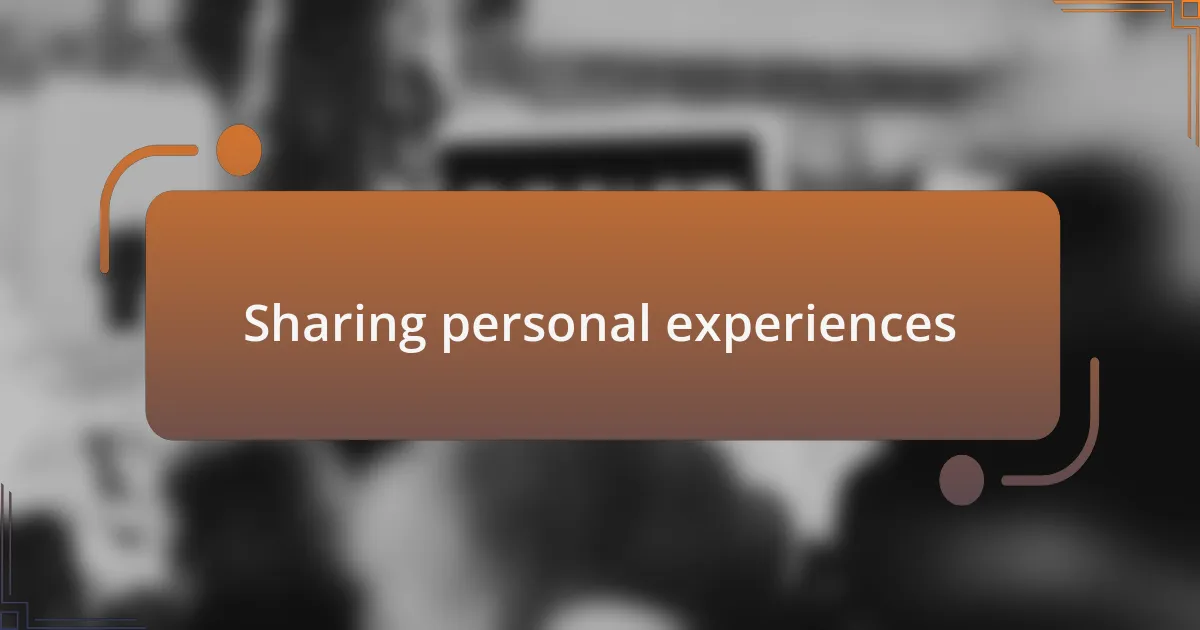
Sharing personal experiences
When I think about sharing personal experiences, I’m reminded of a moment when I volunteered at a pro-life event. I interacted with individuals who had varying life stories, each marked by struggles related to pregnancy and choice. Listening deeply, I realized that these narratives expanded my understanding of bias; how often do we really listen to the stories behind differing opinions?
In another instance, I participated in a forum where people shared their reasons for opposing abortion. One woman spoke about her own past, revealing how a difficult choice affected her deeply. I felt a wave of empathy wash over me, challenging my previous assumptions. It made me ponder: can vulnerability become a bridge to understanding rather than merely a point of contention?
Reflecting on family gatherings, I remember my own struggle with differing views among loved ones. During a conversation, my cousin passionately defended her pro-choice stance, and I felt my heart race. Instead of shutting down, I decided to share my perspective and invited her to share more about hers. That exchange taught me that personal stories can transform rigid beliefs. How often do we shy away from these conversations when they might lead us to a greater understanding of ourselves and others?
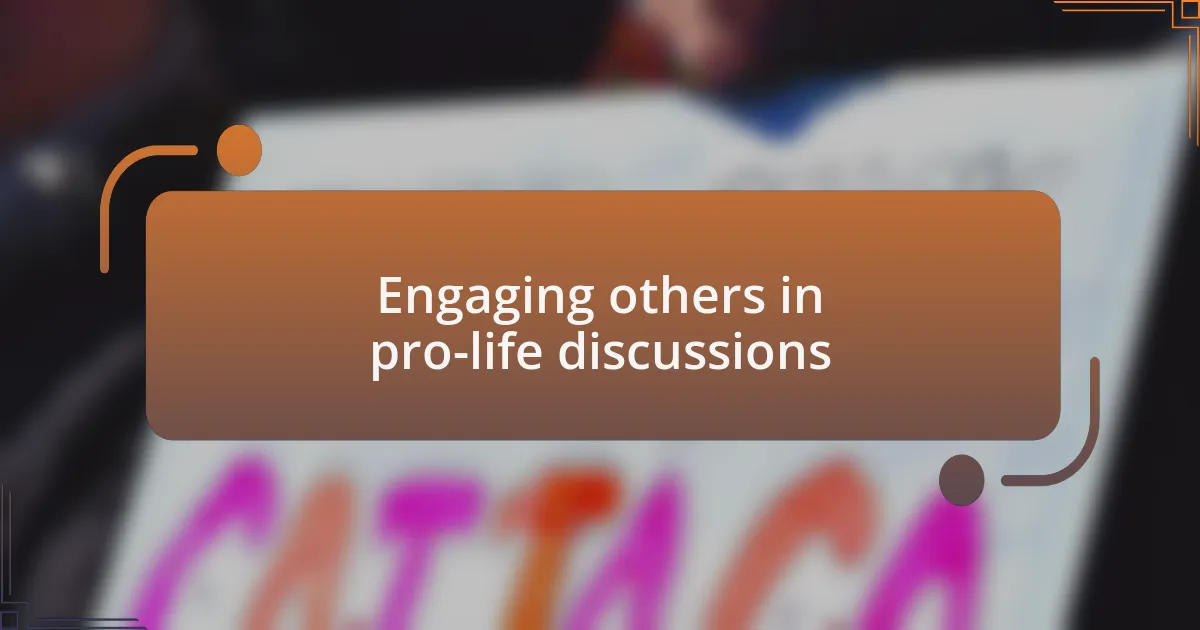
Engaging others in pro-life discussions
Engaging in pro-life discussions often requires a delicate balance of assertiveness and empathy. I recall a coffee chat with a close friend who held strong pro-choice beliefs. Rather than confronting her with statistics right away, I asked her about her views and listened actively. That conversation opened a door to deeper understanding and allowed me to express my thoughts without alienating her. When discussions start with genuine curiosity, they often lead to surprising revelations.
One evening at a local community event, I found myself in a spirited debate with a fellow participant. As the discussion heated up, I made a conscious choice to focus on common ground—our shared desire to support women and families. I shared stories of those I’ve met in counseling situations who found hope in unexpected places. By framing the dialogue around shared values, we both left with new perspectives rather than hardened opinions. Isn’t it fascinating how shifting the focus can turn a conflict into a collaborative journey?
Sometimes, the most impactful conversations occur when I least expect them. I remember chatting with an acquaintance at a wedding who casually dismissed pro-life views. Instead of retreating, I decided to share the emotional journey of a friend who faced a pregnancy crisis. This personal narrative resonated so deeply that it shifted the tone of our exchange. How often do we underestimate the power of storytelling in changing hearts and minds? It’s in those moments that I realize we can engage others by simply inviting them into our stories.